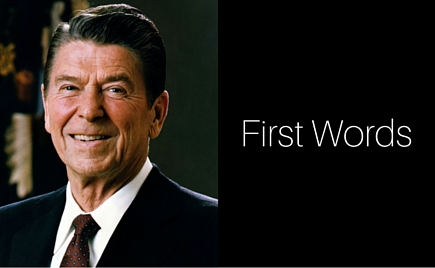First Words: Ronald Reagan, January 20, 1981

Ronald Reagan narrowly lost out to incumbent President Gerald Ford for the Republican Party nomination in 1976 but easily became the Republican standard-bearer in 1980, cementing the triumph of conservatives within the party. After some early missteps in the general election campaign, Reagan succeeded in portraying himself as the optimistic alternative to the frustrating presidency of Jimmy Carter, and he won the election with roughly ten times the number of electoral votes: 489–49. Carter's showing was the worst for any incumbent president since Herbert Hoover in 1932, largely because dissatisfaction outweighed any reservations about Reagan among undecided voters.
As he entered office, Reagan was no longer simply an alternative, and he laid out his straightforward agenda—tax cuts, reducing the size government, and balancing the federal budget—in the eloquent and optimistic tones that earned him the moniker “The Great Communicator.”
These United States are confronted with an economic affliction of great proportions. We suffer from the longest and one of the worst sustained inflations in our national history. It distorts our economic decisions, penalizes thrift, and crushes the struggling young and the fixed-income elderly alike. It threatens to shatter the lives of millions of our people. Idle industries have cast workers into unemployment, human misery, and personal indignity. Those who do work are denied a fair return for their labor by a tax system which penalizes successful achievement and keeps us from maintaining full productivity.
. . .
For decades we have piled deficit upon deficit, mortgaging our future and our children's future for the temporary convenience of the present. To continue this long trend is to guarantee tremendous social, cultural, political, and economic upheavals. You and I, as individuals, can, by borrowing, live beyond our means, but for only a limited period of time. Why, then, should we think that collectively, as a nation, we're not bound by that same limitation? We must act today in order to preserve tomorrow.
. . .
In this present crisis, government is not the solution to our problem; government is the problem. From time to time we've been tempted to believe that society has become too complex to be managed by self-rule, that government by an elite group is superior to government for, by, and of the people. Well, if no one among us is capable of governing himself, then who among us has the capacity to govern someone else? All of us together, in and out of government, must bear the burden.
. . .
We are a nation that has a government—not the other way around. And this makes us special among the nations of the Earth. Our government has no power except that granted it by the people. It is time to check and reverse the growth of government, which shows signs of having grown beyond the consent of the governed.
. . .
We shall reflect the compassion that is so much a part of your makeup. How can we love our country and not love our countrymen; and loving them, reach out a hand when they fall, heal them when they're sick, and provide opportunity to make them self-sufficient so they will be equal in fact and not just in theory?
Find out more about Ronald Reagan.
Read or watch Reagan's entire Inaugural Address.